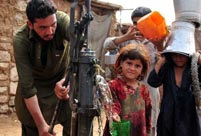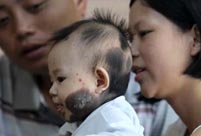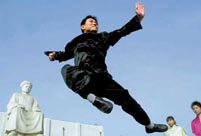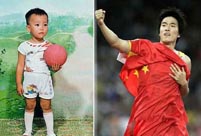On a massif in Laiyuan, north China's Hebei province, 73 years ago, Chinese communist soldiers won a major battle against Japanese invaders.
Altogether, 221 Chinese soldiers lost their lives at Dongtuanpu, and 173 heavily armed Japanese officers were killed.
"The Japanese put the ashes of their soldiers in the Yasukuni shrine, but until today, a cemetery for the Chinese martyrs who lost their lives safeguarding their homeland has yet to be finished," said Liu Chunyang, tourist chief of Laiyuan County, on Wednesday.
A column of the Chinese Eighth Route Army made a surprise attack on a Japanese officer training camp at Dongtuanpu on Sept. 22, 1940.
The victory at Dongtuanpu was part of the One Hundred Regiments Campaign in the north China region, the longest campaign by the Chinese communist army against the Japanese during World War II.
Wednesday marked the 82nd anniversary of the Japanese invasion of northeast China
On Sept. 18, 1931, Japanese troops blew up a section of a railway and bombarded the barracks of Chinese troops near Shenyang, starting the invasion of northeast China.
The incidents were followed by a full-scale invasion of China and the rest of Asia, triggering the 14-year War of Resistance Against Japanese Aggression.
Liu said the Laiyuan cultural department has found a poem written during the war, engraved on two stone tablets in Chinese characters by Koshiba Toshio, a Japanese officer, depicting how fierce the fighting at Dongtuanpu was. The battle lasted five days and nights, and "the ashes of the dead Japanese soldiers were sent back to the Yasukuni Shrine for worship."
Liu, who is in his 50s said his uncle was among a Chinese squad who fought in the battle. He said the main Japanese forces rushed to support the battle front in Dongtuanpu after the training camp was raided. Chinese troops made a rapid sweep of the battlefield before moving elsewhere, but the Japanese recaptured the battlefield, cremated the dead and took the ashes away.
The remains of the Chinese soldiers, however, were scattered after floods washed away their burial mounds.
After the New China was founded in 1949, the Laiyuan county government mobilized the people to collect the remains of the martyrs, who only found 197 of them and buried the remains together.
In 2006, Liu made a design for a cemetery, hoping to give a decent burial to the Dongtuanpu martyrs.
"People shed tears as they wrapped up the 197 remains in red cloth, relocating them to the cemetery in 2008. There were 24 empty tombs." said Liu.
In the cemetery, there is a screen wall behind a tall white monument. Inside, the 221 tombs of white-painted cement blocks are in neat alignment.
Liu plans a bas-relief of red sandstone on the screen wall and a memorial hall in the cemetery, but the county lack the funding to support the construction.
The hilly revolutionary base of Laiyuan, about 160 km southwest of Beijing, is one of China's most impoverished counties.
"Most of the Chinese soldiers who died in the battle were local farmers who had taken up weapons to defend their homeland. Some of them were only aged 16 or 17, when they died," Liu said, adding the cultural department had searched for the names of the dead warriors.
Liu said years ago, some Japanese wanted to come to Laiyuan to mourn the Japanese soldiers who died at Dongtuanpu. Their appeal was rejected by the county government.
"We welcome Japanese tourists to visit Laiyuan, not to worship the dead soldiers but to reflect on history and apologize to the Chinese people for their war crimes," Liu said.
 Pakistan suffers desperate shortage of water
Pakistan suffers desperate shortage of water New model of indigenous surface-to-air missiles testfired
New model of indigenous surface-to-air missiles testfired  Heritage train ride across western Kosovo
Heritage train ride across western Kosovo Baby girl 'too young' for birthmarks treatment
Baby girl 'too young' for birthmarks treatment Beijing court hears airport blast case
Beijing court hears airport blast case Harbin named Chinese city with most beautiful women
Harbin named Chinese city with most beautiful women Wushu spirit
Wushu spirit Rugby girls
Rugby girls Funniest photos of sport stars as kids
Funniest photos of sport stars as kids  Residences of the royal house of Savoy
Residences of the royal house of Savoy China's frigate 'Bengbu'in fire training
China's frigate 'Bengbu'in fire training The last days of Wan Aihua
The last days of Wan Aihua Highlights at 12th National Games of China
Highlights at 12th National Games of China Beijing Film Academy welcomes freshmen
Beijing Film Academy welcomes freshmen 2013 Taiwan Int'l Tourism Expo kicks off in Taipei
2013 Taiwan Int'l Tourism Expo kicks off in TaipeiDay|Week|Month